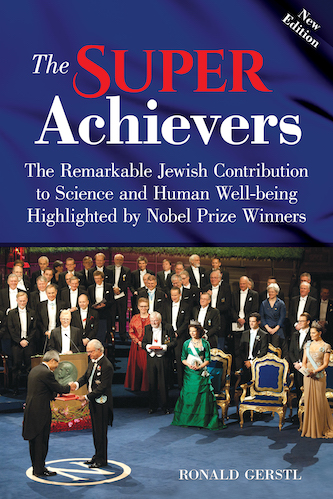 Title: The Super Achievers: The Remarkable Jewish Contribution to Science and Human Well-being Highlighted by Nobel Prize Winners
Title: The Super Achievers: The Remarkable Jewish Contribution to Science and Human Well-being Highlighted by Nobel Prize WinnersAuthor(s) Ronald Gerstl
Published by: Ronald Gerstl“Properly, the Jew ought hardly to be heard of; but is heard of, has always been heard of. His contributions to the world’s list of great names in literature, science, art, music, finance, medicine, and abstruse learning are also way out of proportion to the weakness of his numbers. He has made a marvelous fight in this world, in all ages; and has done it with his hands tied behind him. He could be vain of himself, and be excused for it.”
—Mark TwainEven Mark Twain would be surprised that with only 0.2% of the world’s population, Jews have been awarded almost one out of four of all Nobel Prizes in medicine, physics, and chemistry, while American Jews have received 37% of U.S. awards. This vastly disproportionate number of Nobel Prize winners highlights Jewish achievement and contributions to mankind.
The Super Achievers examines such topics as:
• The rarified world of Nobel Prizes
• Lives and discoveries of groundbreaking Jewish laureates
• Prizewinners’ origins, family and educational backgrounds
• Factors that may explain Jewish exceptionalism
• Tectonic shifts: Where Jews live now and where they used to live
• How America benefited from scientists who fled Nazism
• Barriers to Breakthroughs: The Jewish American experience
• Women who won Nobel Prizes in science
• The rise of Israel as a world science and technology powerhouse
• Are science and religion compatible?
• Nobel science awards around the worldYou’ll also discover…
• The first American to receive a Nobel Prize in science—a Jewish Naval officer
• The German Jewish inventor of poisonous gas used in extermination camps
• Einstein’s Nobel Prize was not for the Theory of Relativity
• Why Jonas Salk did not receive a Nobel Prize
• The 18-year-old Harvard student who was recruited to work on the atomic bomb project
• The Nobel physicist who solved the mystery of the Challenger space disaster
• The physician whose death was kept a secret so he could win a Nobel Prize
• An entrepreneurial laureate whose discoveries led to creating major pharmaceutical companies
• The oldest Nobel science prize winner—a ninety-six-year-old in 2018
• The Nobel physicists who had to wait fifty years to have their findings corroborated. . . and much more
ISBN13: 978-0578549460
Recent Comments